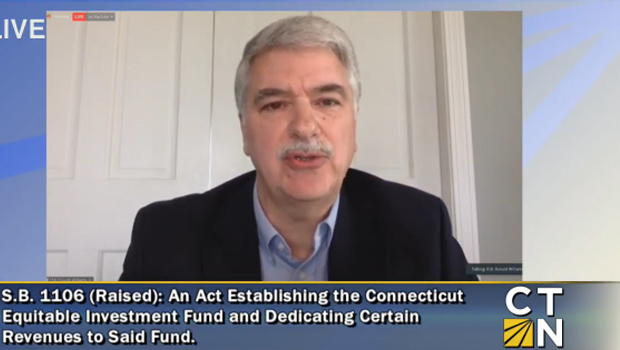Legislators yesterday heard testimony on a bill that would create the Connecticut Equitable Investment Fund and raise $1.14 billion in annual revenue to address education funding inequities and help the state meet the various needs of its communities.
Senate Bill 1106 has strong support from a coalition of likeminded groups—Recovery for All—which includes CEA. Testifying in support of the bill, on behalf of CEA and Recovery for All, were CEA President Jeff Leake and Executive Director Donald Williams.
“It is not acceptable for the pandemic economy to deliver prosperity for a few, and job loss and hunger for many more,” Williams said in a virtual public hearing of the legislature’s Finance, Bonding and Revenue Committee, explaining that while the stock market has had a record year, the vast majority of Connecticut’s residents suffered economic loss and hardship. “Many families,” he pointed out, “do not have enough food to eat.”
Federal aid that will help Connecticut cope with pandemic costs is temporary, he added, while legislation like SB 1106 would create a sensible plan and ongoing revenue to meet the needs of the state’s residents.
“Senate Bill 1106 represents a great step forward to progressively raising revenue we know is necessary to address the huge disparities that exist across our state,” Leake told Finance Committee members. “Connecticut is a state of socioeconomic extremes, where averages mask the extreme wealth in towns like Westport compared to the extreme poverty just a few exits away in Bridgeport.”

CEA President Jeff Leake testifies in support of SB 1106.
Citing statistics from the United Way, Feeding America, and the Connecticut Food Bank, Leake noted that food insecurity has increased 28 percent as a result of the pandemic, and income levels in 38 percent of Connecticut households fall short of what’s needed to pay for basics such as housing, food, childcare, healthcare, technology, and transportation.
“This bill provides pathways to rebuilding our communities and reducing the crushing effects of income inequality that exist in our state,” said Leake. “It produces revenue that will help so many Connecticut families—among them, the families of students we teach. And when we lift up communities and families, we lift up our students. We lift up our students when we know that they come to us from and return at the end of the day to a home where they feel safe; we lift up our students when families can afford adequate and healthy food choices. We lift up our students when they have access to quality healthcare. All of these ‘lifts’ will improve academic performance, increase graduation rates, and decrease food insecurity. These ‘lifts’ will likely reduce developmental delays and behavior problems in our schools and result in fewer days of missed school.”
SB 1106 proposes raising revenue on capital gains, high-income consumption, and digital advertising—an equitable approach, Williams said, that taps into segments that have profited during the pandemic. Investments would improve community infrastructure, increase owner-occupied housing, and provide training in vocational, technical, and skill development areas to enhance job opportunities, among other things.
“Equitable investment makes sense for our state,” Williams told legislators, “and I urge you to support it.”
Join fellow CEA members and learn more about what’s next in the Recovery for All campaign in a virtual meeting on Monday, April 26, at 4:30 p.m. Register here.







